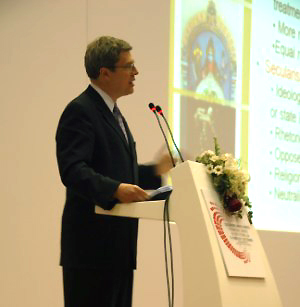Scharffs at Istanbul International Congress on Constitutional Law, 11-14 May 2011

Brett G. Scharffs, Francis R. Kirkham Professor of Law and Associate Director of the International Center for Law and Religion Studies at Brigham Young University, participated in the International Congress on Constitutional Law held in Istanbul, 11-14 May 2011. The primary purpose of the Congress was “to provide academic and civilian contributions to the formation of a civilian constitution” in Turkey. To this end some 50 Turkish scholars and goverment leaders joined with some 40 foreign participants to discuss constitutional law issues from a wide variety of perspectives. Professor Scharffs’ paper was entitled “Secularity or Secularism: Two Competing Visions for the Relationship between Religion and the State in the New Turkish Constitution.”
The Scharffs paper abstract: One of the most controversial issues in crafting a new constitution for Turkey will likely be the definition and conceptualization of what kind of secular state Turkey envisions for itself and what the relationship between religion and the state ought to be. In this paper I want to suggest that there is an important, perhaps critical, distinction between secularity and secularism – in particular that one concept is a fundamental component of liberal pluralism and a bastion against religious extremism, and that the other is a misguided, even dangerous, ideology that may degenerate into its own dystopian fundamentalism. Secularity is an approach to religion-state relations that avoids identification of the state with any particular religion or ideology (including secularism itself) and that endeavors to provide a neutral framework capable of accommodating a broad range of religions and beliefs. Secularism, in contrast, is an ideological position that is committed to promoting a secular order. In this paper I will illustrate the difference between these conceptualizations of the secular state with illustrations focusing on the institutional relationships between religion and the state, and the individual’s relationship with the state.